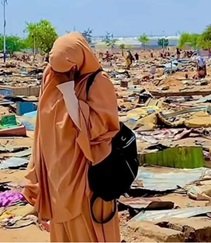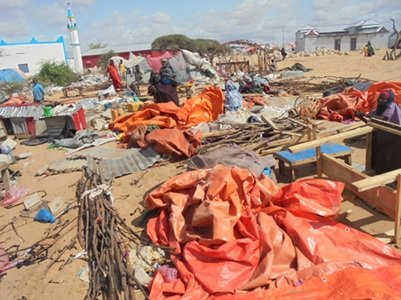By Isha Qarsoon
In most countries, the sale of public land that holds a hospital, a school, a market, or a cemetery is a matter of public record. It is announced, debated, documented. Citizens can question it, challenge it, or at least demand to know why it is happening. In Somalia, the reality is inverted. The most valuable public properties change hands in silence. Not quite by accident, but quiet by design. There are no tenders, no gazette notices, no parliamentary votes. When the deal is done, the public sees its first sign not in the press but in bulldozers, security cordons, or locked gates. The old owner is the people; the new one is a name no one will admit to knowing.
In a functioning state, the courts could intervene. Evidence could be tested. Officials could be questioned under oath. Transactions could be reversed if they were unlawful. But Somalia’s judiciary has been kept deliberately weak, its oversight bodies underpowered, its executive controlling not just the security forces but the channels of administration that could expose or block these transfers. What remains is the thin record of these events, stitched together by parliamentary speeches, scattered investigative journalism, civil society statements, and the memories of communities watching their commons disappear. The pattern is undeniable.
In August 2025, one of Mogadishu’s key health facilities — Laansareeti Hospital — and the adjacent Ministry of Health compound vanished from the public sphere. As reported by WardheerNews, opposition MP Abdirahman Abdishakur took the extraordinary step of accusing the federal government of selling them off in a hidden deal. These were not derelict properties. They were functioning institutions, battered by years of conflict but still serving the public. Their sale was not announced. There was no tender. No statement to Parliament. No consultation with the communities they served. Caasimada Online reported the same allegations, with civil society groups publicly echoing the outrage. Abdishakur called it a betrayal of the public good. In a country with one of the lowest ratios of doctors to patients in the world, removing a major hospital from public control is not just a financial decision. It is an attack on public health itself.
Just weeks earlier, in July 2025, another pillar of urban life fell. Siinay Market had been one of Mogadishu’s enduring commercial hubs. Local reporting by Radio Dalsan and Somali Guardian described the same scene: traders arriving to find partial demolitions already underway, guarded by security forces. Rumors of a land sale spread across the stalls. The government did not deny it. It also did not explain it. No paperwork was shown. No process was acknowledged. For the traders, this was not simply a commercial disruption. It was the destruction of a livelihood. Markets are not just places to buy and sell. They are social anchors, sites of trust, and micro-economies that sustain thousands of families. Overnight, Siinay became land “no longer theirs.”
By January 2025, the pattern was so blatant that ninety-seven Members of Parliament — cutting across party and clan lines — issued a joint public warning against buying public land in Mogadishu. Their statement, reported by Hiiraan Online, accused the government of auctioning properties in secret, including school and university grounds. This was not the opposition talking. It was a cross-party, cross-clan group of legislators, publicly warning private buyers not to touch these deals. For MPs to tell the market, “do not buy from your own government,” is extraordinary. It is also damning.

In July 2025, the PeaceRep programme had linked these land disposals to a deeper political economy. Public assets — including a cemetery and a former military camp — had been sold or transferred not for public development but as political currency. In this system, land is a tool to secure loyalty, to pay for allegiance, to reward allies. It is the logic of a political marketplace where public goods are not rights but bargaining chips.
In January 2025, former president Sharif Sheikh Ahmed, former prime minister Hassan Ali Khaire, and Abdishakur held a joint press conference. They condemned what they called “secret disposals” of public lands — cemeteries, schools, military sites. Their claim, carried by Warya TV, was even more explosive: that proceeds from these sales were not reaching the state treasury. Instead, they alleged, the money was being funneled into private accounts, sometimes directly to the families of those in power.
Perhaps the most disturbing case predates all of these. In October 2024, Abdishakur revealed that a public cemetery had been sold outright. The Somali Digest covered the story, noting the absence of any state oversight and the deep cultural violation involved in commodifying burial grounds. For many Somalis, this was the red line. A country that sells its hospitals is in crisis. A country that sells its cemeteries has abandoned the most basic norms of respect for the dead.
Seen in isolation, each case could be dismissed as a misunderstanding or a local dispute. Seen together, they form a coherent picture: properties chosen are consistently high-value, both financially and politically; the process is consistently opaque, with no tenders, no gazettes, no consultations; security forces are used not to protect public interests but to enforce transfer; buyers remain unnamed, terms undisclosed, proceeds untraced. This is not silence by accident. It is silence as policy.
This is not ordinary corruption. It is state capture. In a captured state, the machinery of government is repurposed to serve the interests of a ruling clique rather than the public. It works by controlling appointments, placing loyalists in every position that could block or expose corrupt transactions — from procurement boards to land registries to courts. It works by monopolizing information, keeping transactions off the public record and using bureaucratic or security barriers to deny access to land documents. It works by repurposing the state’s coercive power, deploying police or military not to protect citizens but to remove them from assets earmarked for disposal. And it works by turning public assets into political currency, distributing them to allies in exchange for loyalty, selling them to fund elections, or using them to buy silence.
Somalia’s disposals fit this model exactly. These are not random sales. They are deliberate transfers, chosen because they can bind an ally, buy a faction, or generate cash for political survival. The hospital, the market, the cemetery, the military camp, the school — each is both a public good and a private bargaining chip.
The money does not stay in Somalia. That is one reason the disposals are so brazen: the endgame is not local development but private enjoyment abroad. The funds are layered through shell companies, moved via correspondent banks, and parked in jurisdictions with weak beneficial ownership transparency. Dubai, Nairobi, London, Toronto, Minneapolis — all have seen the wealth of African state capture before. The routes are well worn.
International law is not powerless here. FATF standards identify politically exposed persons and high-risk jurisdictions as requiring enhanced due diligence. The UN Convention Against Corruption obliges signatories to cooperate in tracing, freezing, and returning stolen assets. The U.S. Kleptocracy Asset Recovery Initiative, the UK’s Proceeds of Crime Act, and EU anti–money laundering directives all allow freezing and confiscating assets linked to corruption abroad, even without a conviction at home. Unexplained wealth orders can compel foreign asset holders to prove the lawful origin of their funds.
Why, then, has none of this been applied to Somalia’s ruling clique? The answer is uncomfortable. Western governments see the disposals. Their intelligence services track the money. Their banks handle the transactions. But Somalia’s president is still treated as a partner in counterterrorism, migration control, and regional security. To act against him would be to jeopardize that relationship. So they look away. This complicity must end. The self-described civilized world cannot claim to champion transparency, human rights, and rule of law while allowing the theft of Somalia’s commons to go unchallenged — especially when the stolen money is ending up in their own financial systems. They should make it clear: if the disposals continue, the president and his inner circle will face targeted sanctions, travel bans, and asset freezes. Their bank accounts abroad will be seized. Their ability to enjoy the proceeds of theft will end.
The president controls the home ground. No one should expect him to act against his own system. But the Somali public — and especially the youth — must decide whether they are willing to lose their inheritance in silence. Lasareeti Hospital was yours. Taleex Hotel was yours. Your schools, your universities, your markets, your cemeteries — all yours. If you stay silent, you will inherit nothing but the memory of what once stood. Landowners should understand that every prime public plot secretly transferred depresses the value of their own land. When free prime land floods the market, private property values fall. This is theft not only of public wealth but of private wealth. Members of Parliament should know that their January 2025 warning was a start, but warnings are not enough. Use every tool — inquiry, media, petitioning — to force these transactions into the light.
When a hospital disappears into private hands, it is not just a building lost but an entire community’s access to care. When a market is cleared for sale, livelihoods vanish overnight. When a school compound is sold, the nation’s future is narrowed. When a cemetery is auctioned, cultural dignity is violated. These are not property transactions. They are acts that erode the physical, social, and moral foundations of the Somali state. The theft is quiet because quiet is easier. But the cost is loud: weaker health, fewer jobs, poorer education, lost dignity. In the absence of courts, public memory must become the courtroom, and public opinion the jury. The names of these places — Laansareeti Hospital, the Ministry of Health compound, Siinay Market, the cemetery, the military camp, the university grounds — must be repeated in Parliament, in media interviews, on radio talk shows, and across diaspora networks.
Somalia’s public lands are its shared inheritance. To lose them in silence is to surrender them without a fight. The events of the past year show not just what is at stake, but how the dispossession works. They also show that defenders of the commons still exist — MPs who will speak, journalists who will investigate, communities who will resist. They may not yet have the means to stop the sales, but they have the means to expose them. And in Somalia’s current reality, exposure is not just an act of journalism; it is an act of national defense. If the land under a hospital bed, a market stall, a classroom, or a grave can be sold in the dead of night, then the very idea of a public sphere is for sale. The only way to protect it is to speak its name, mark its loss, and refuse to let it vanish into the shadows. Only then can the quiet theft of Somalia’s commons be brought into the light, where it can no longer hide behind silence.
Isha Qarsoon
Email: Ishaqarsoon1@gmail.com
————-
Isha Qarsoon- is a platform dedicated to addressing critical issues pertaining to good governance, corruption, and social challenges. It emphasizes investigative journalism as a means to uncover and disseminate information, enabling the public to engage with and understand the realities of the country. Through its focus on transparency and accountability, the forum aims to foster informed public discourse and contribute to societal awareness and reform.


Leave a Reply